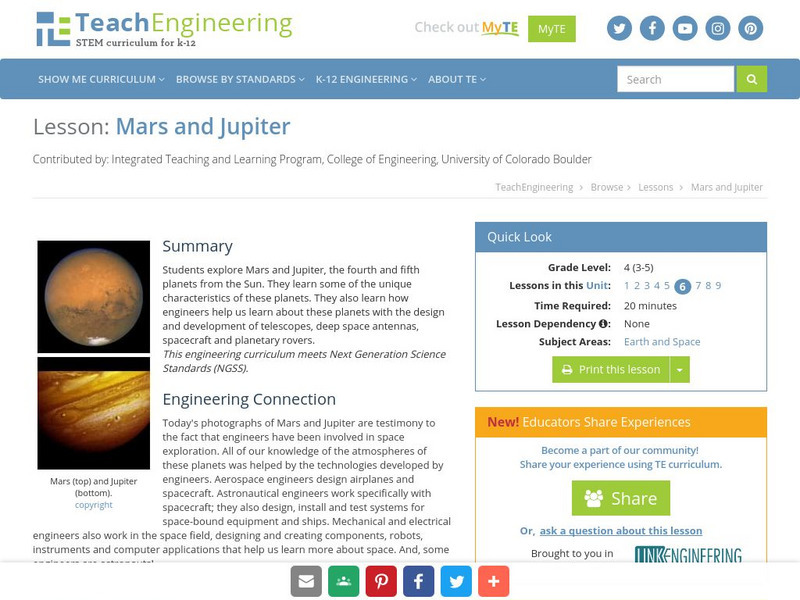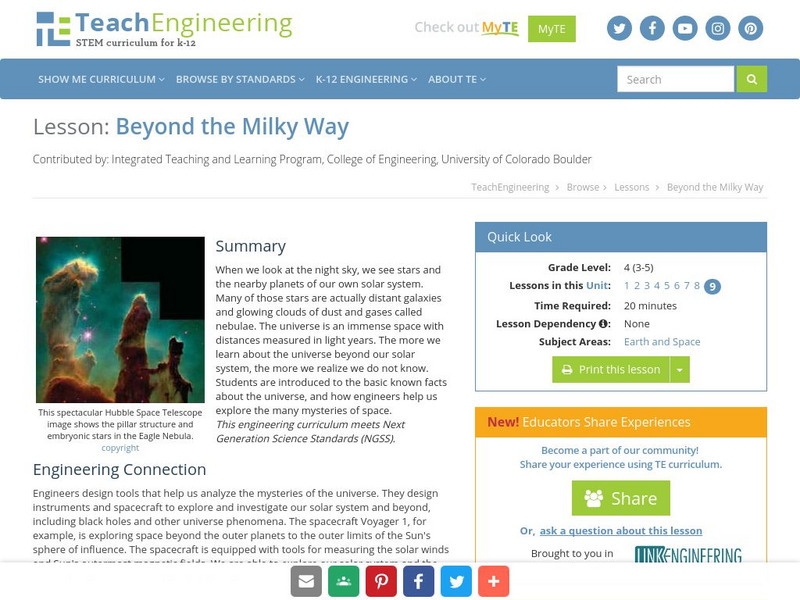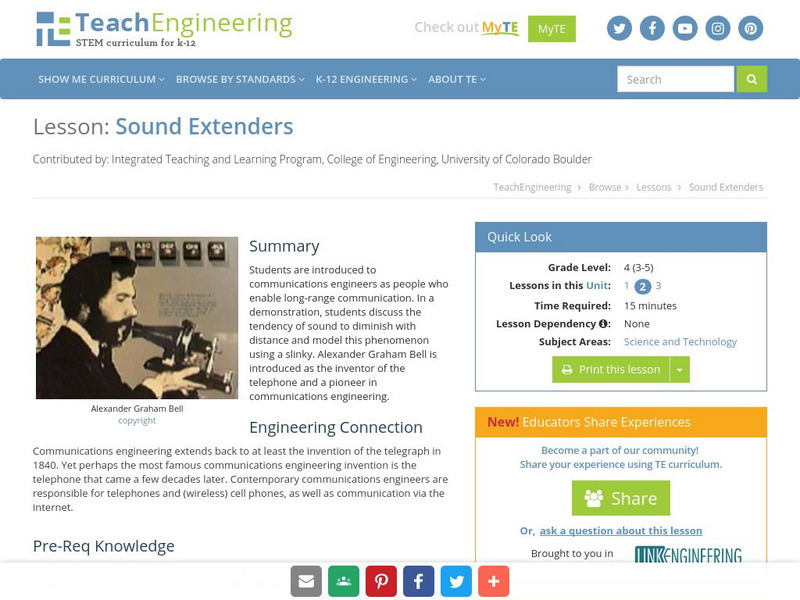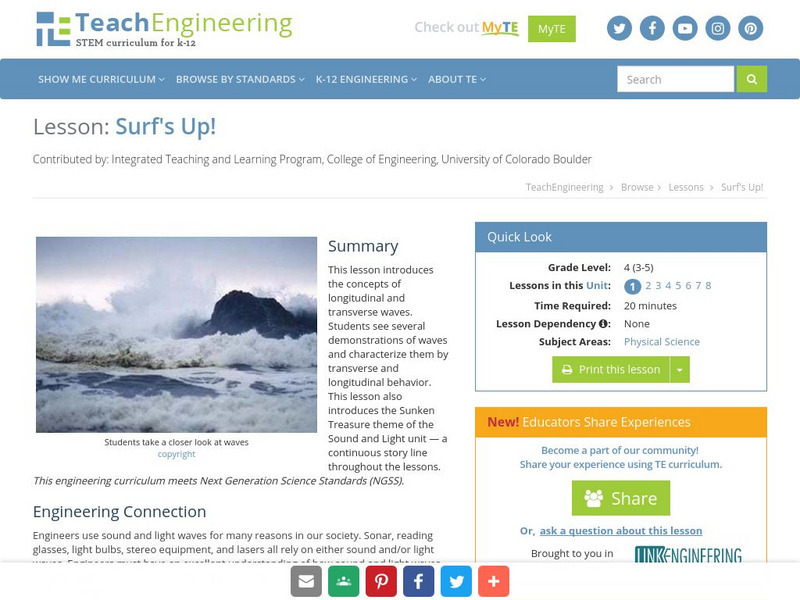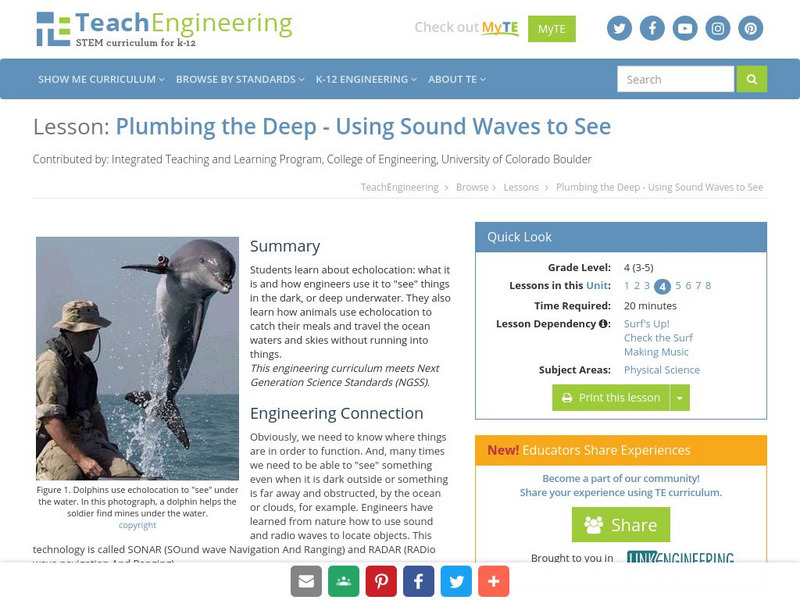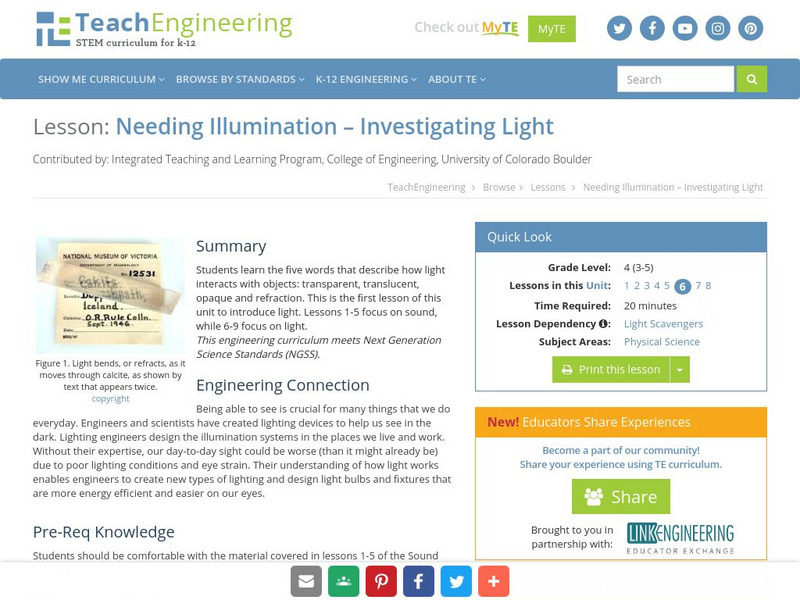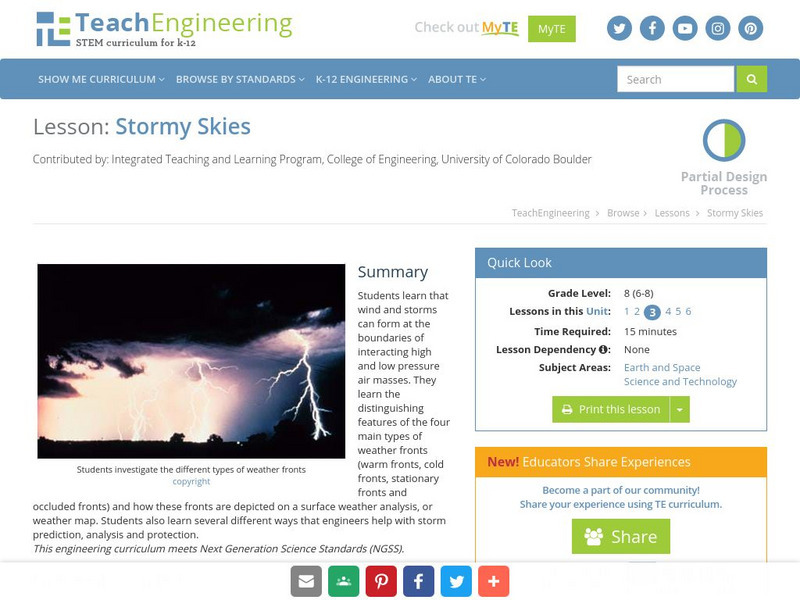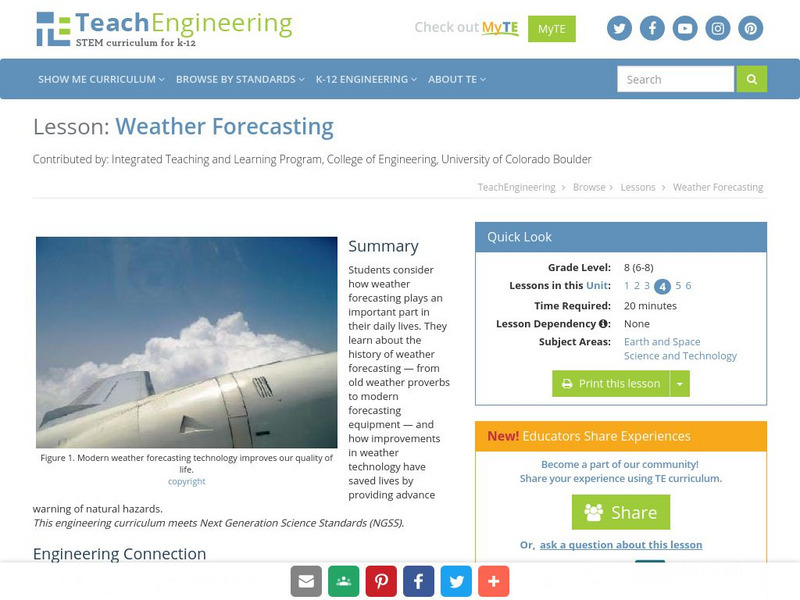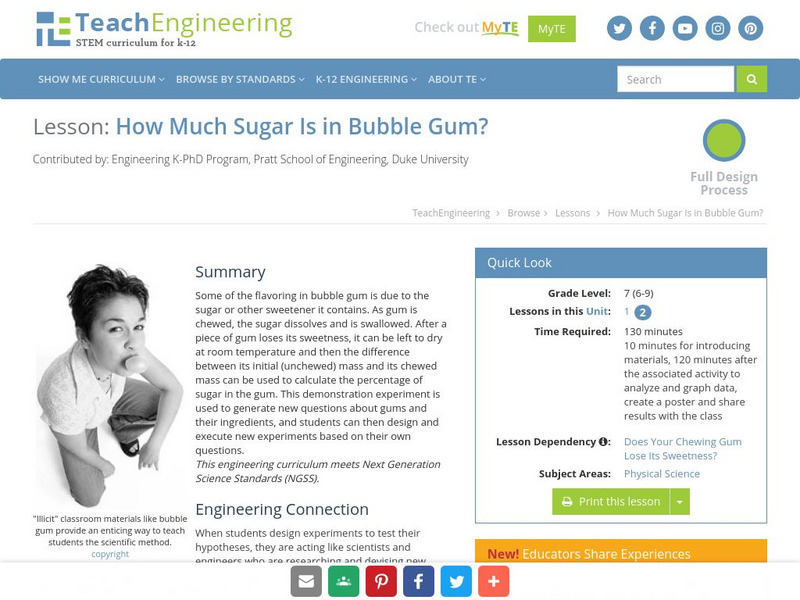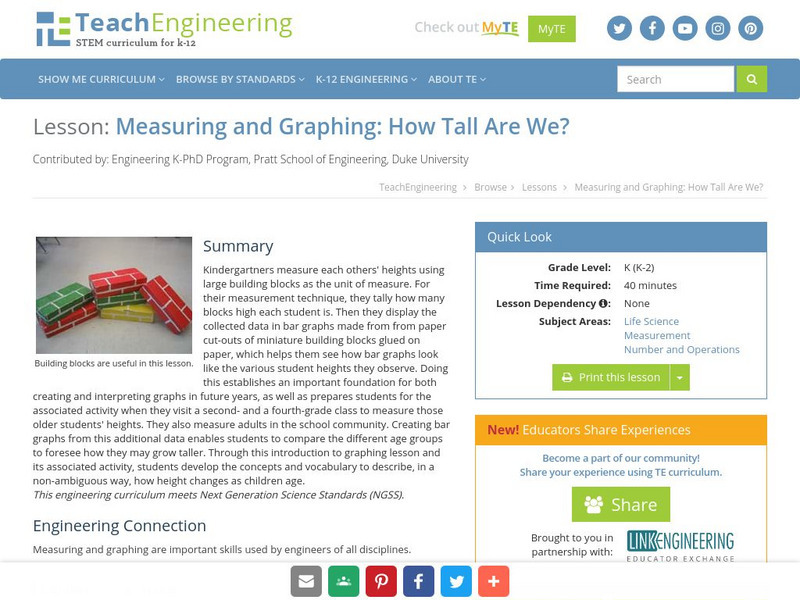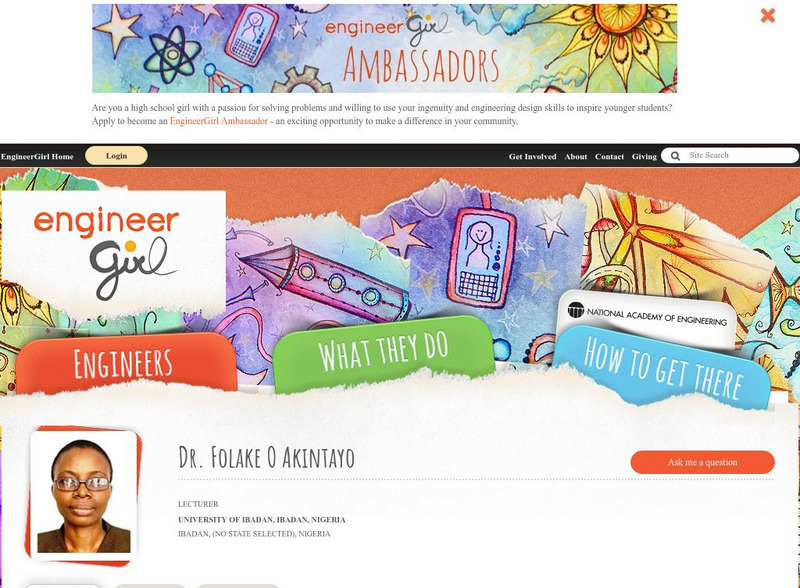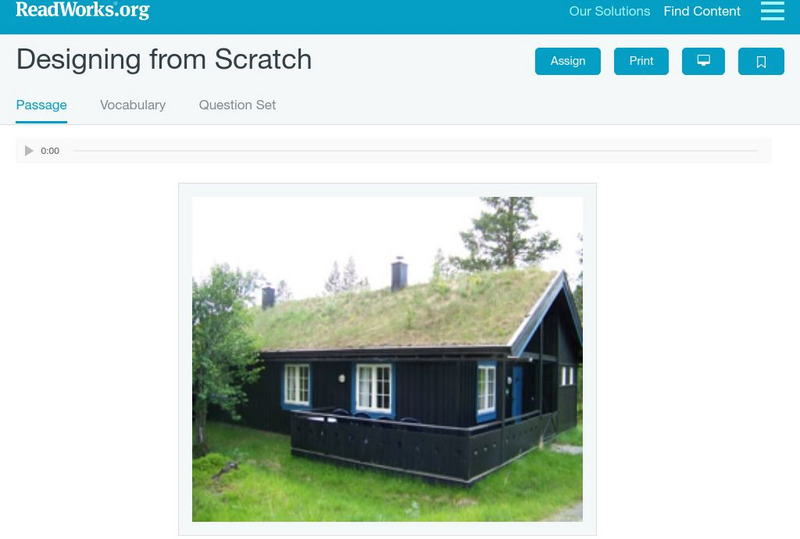TeachEngineering
Teach Engineering: Mars and Jupiter
Students explore Mars and Jupiter, the fourth and fifth planets from the Sun. They learn some of the unique characteristics of these planets. They also learn how engineers help us learn about these planets with the design and development...
TeachEngineering
Teach Engineering: The Outer Planets
Students explore the outermost planets of our solar system: Saturn, Uranus and Neptune. They also learn about characteristics of Pluto and its interactions with Neptune. Students learn a little about the history of space travel as well...
TeachEngineering
Teach Engineering: Life in Space: The International Space Station
Students are introduced to the International Space Station (ISS) with information about its structure, operation and key experiments. The ISS itself is an experiment in international cooperation to explore the potential for humans to...
TeachEngineering
Teach Engineering: Beyond the Milky Way
When we look at the night sky, we see stars and the nearby planets of our own solar system. Many of those stars are actually distant galaxies and glowing clouds of dust and gases called nebulae. The universe is an immense space with...
TeachEngineering
Teach Engineering: Audio Engineers: Sound Weavers
In this lesson plan, students are introduced to audio engineers. They discover in what type of an environment audio engineers work and exactly what they do on a day-to-day basis. Students come to realize that audio engineers help produce...
TeachEngineering
Teach Engineering: Sound Extenders
In this lesson, young scholars are introduced to communications engineers as people who enable long-range communication. In the lesson demonstration, students discuss the tendency of sound to diminish with distance and model this...
TeachEngineering
Teach Engineering: Sound Environment Shapers
In this lesson plan, students are introduced to the sound environment as an important aspect of a room or building. Several examples of acoustical engineering design for varied environments are presented to students. Students learn the...
TeachEngineering
Teach Engineering: Surf's Up!
This lesson introduces the concepts of longitudinal and transverse waves. Students see several demonstrations of waves and characterize them by transverse and longitudinal behavior. This lesson also introduces the Sunken Treasure theme...
TeachEngineering
Teach Engineering: Checking the Surf
This lesson introduces the concepts of wavelength and amplitude in transverse waves. In the associated activity, learners will use ropes and their bodies to investigate different wavelengths and amplitudes.
TeachEngineering
Teach Engineering: Plumbing the Deep: Using Sound Waves to See
In this instructional activity, students learn about echolocation: what it is and how engineers use it to "see" things in the dark, or deep underwater. Also, they learn how animals use echolocation to catch their dinner and travel the...
TeachEngineering
Teach Engineering: Needing Illumination: Investigating Light
This is the first lesson of this unit to introduce light. In this lesson, students learn the five words that describe how light interacts with objects: "transparent," "translucent," "opaque," "reflection" and "refraction."
TeachEngineering
Teach Engineering: Visible Light and the Electromagnetic Spectrum
In this instructional activity, the electromagnetic spectrum is explained and students learn that visible light makes up only a portion of this wide spectrum. Students also learn that engineers use electromagnetic waves for many...
TeachEngineering
Teach Engineering: Weather Basics
Students are introduced to the basics of the Earth's weather. Concepts include fundamental causes of common weather phenomena such as temperature changes, wind, clouds, rain and snow. The different factors that affect the weather and the...
TeachEngineering
Teach Engineering: Air Under Pressure
Students are introduced to air masses, with an emphasis on the differences between and characteristics of high - versus low-pressure air systems. Students also hear about weather forecasting instrumentation and how engineers work to...
TeachEngineering
Teach Engineering: Stormy Skies
Students learn that wind and storms can form at the boundaries of interacting high and low pressure air masses. They learn the distinguishing features of the four main types of weather fronts (warm fronts, cold fronts, stationary fronts...
TeachEngineering
Teach Engineering: Weather Forecasting
Students begin this lesson by considering how weather forecasting plays an important part in their daily lives. They learn about the history of weather forecasting -from old weather proverbs to modern forecasting equipment - and how...
TeachEngineering
Teach Engineering: How Much Sugar Is in Bubble Gum?
Most of the flavoring in gum is due to the sugar or other sweetener it contains. As gum is chewed, the sugar dissolves and is swallowed. After a piece of gum loses its flavor, it can be left to dry at room temperature and then the...
TeachEngineering
Teach Engineering: The Next Dimension
The purpose of this lesson is to teach students about the three dimensional Cartesian coordinate system. It is important for structural engineers to be confident graphing in 3D in order to be able to describe locations in space to fellow...
TeachEngineering
Teach Engineering: How Tall Are We?
Kindergartners measure each other's height using large building blocks, then visit a 2nd and a 4th grade class to measure those students. They can also measure adults in the school community. Results are displayed in age-appropriate bar...
Other
Engineer Girl: Why Be an Engineer
The National Academy of Engineering promotes engineering as a career, especially to women and girls. Answer questions you have about becoming an engineer and about being an engineer.
Other
Engineer Girl: Fun Facts
Learn fun facts about engineering, women engineers, and engineering achievements.
Read Works
Read Works: Designing From Scratch
[Free Registration/Login Required] Students read about using a design process to solve problems while building new buildings. A question sheet is available to help students build skills in reading comprehension.
CK-12 Foundation
Ck 12: Engineering
[Free Registration/Login may be required to access all resource tools.] A resource guide to engineering textbooks. Includes several engineering online texts with links to download the text to PDF, Kindle or Ipad.
Other
The Institution of Mechanical Engineers: Homepage
This is the website from the The Institution of Mechanical Engineers for a mechanical engineering professional society in the United Kingdom.


